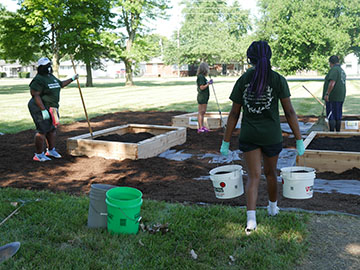Volunteers Break Ground on New Community Garden in Martindale-Brightwood Food Desert Area
7/21/2020
 On Saturday, July 18, 25 HealthNet volunteers built and planted a community garden on the campus of HealthNet Martindale-Brightwood Health Center, 2855 N. Keystone Ave., located within one of the city’s food deserts.
On Saturday, July 18, 25 HealthNet volunteers built and planted a community garden on the campus of HealthNet Martindale-Brightwood Health Center, 2855 N. Keystone Ave., located within one of the city’s food deserts.
The team assembled six raised garden beds and planted fall vegetable crops and several fruit trees to complete phase I of the 40 ft. x 50 ft. HealthNet Community Garden, sponsored by HealthNet’s Healthy Aging Committee. Funding for the garden build day was provided by donations to the HealthNet Foundation’s Garden Fund. Purdue Extension - Marion County's Urban Ag team coached the group in planning the garden over the past several months.
Produce from the garden will be given away to health center patients and community members this fall. The group plans to add more raised beds next spring, as well as offer cooking classes, health education and programs that focus on urban gardening.
The new garden supports the efforts of the Martindale-Brightwood 7 initiative and the neighborhood’s Quality of Life plan to build a food resource network for area residents.
A 2019 study by the Polis Center at Indiana University-Purdue University campus revealed that one fifth of the city’s population now lives in a food desert. Food access tends to be worse for black residents and people in poverty. About one third of black residents in Indianapolis live in food deserts, and the same is true for people in poverty.
Martindale Brightwood has the highest poverty rate in Marion County. With a median household income of $23,203, 40 percent of households pay more than 35 percent of their income towards rent or mortgage. Due to inequality (poverty and access to resources) in this community, residents face shorter life expectancy rates.
Federally Qualified Health Centers (FQHCs) like HealthNet serve the most vulnerable in the community and are the largest source of primary and preventative care for the nation’s underserved, serving 28 million annually. There are more than 1,300 FQHCs nationwide and 25 in Indiana. They began in the 1960s as a social experiment during America’s War on Poverty. Community health centers overcome barriers to care by being:
-
Located in high-need areas
-
Open to everyone
-
Offering support services that help patients access care
-
Tailoring their services to fit the special needs and priorities of their communities.
Through its nine community health centers in Indianapolis and Bloomington, HealthNet provides primary care, behavioral health, dental, OB/GYN and support services to more than 60,000 residents each year – the majority of whom live below the poverty line.
The HealthNet Foundation is a not-for-profit organization that helps HealthNet continue to offer quality clinical services and outreach programs that are current, compassionate and effective for those in need. Charity care is also supported by the Foundation to ensure emergency medical needs such as medications, food, shelter, or transportation to and from medical offices are available to anyone in need. In addition, the Foundation works to reduce the stigma associated with poverty and community health issues and supports community education and outreach, including prevention and wellness programs.